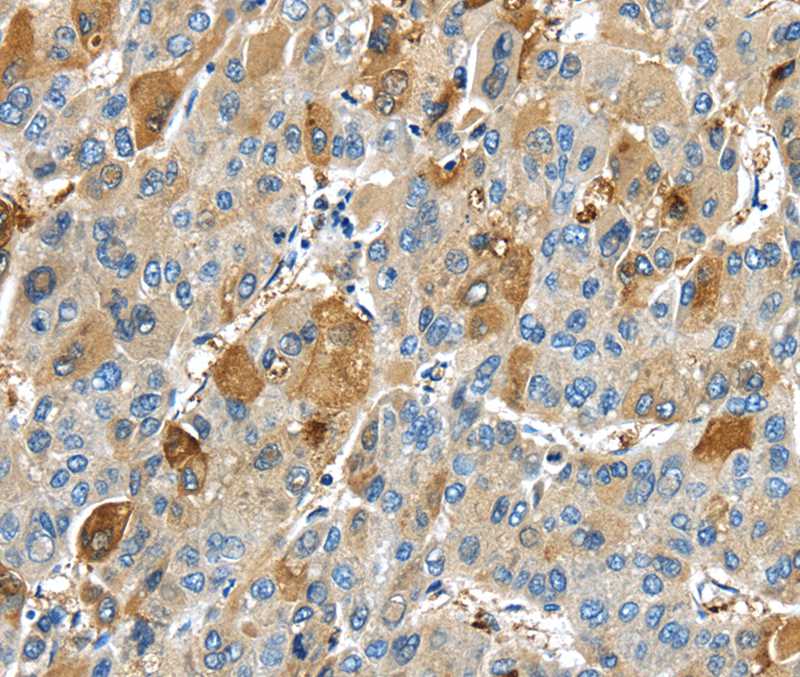
| WB | 咨询技术 | Human,Mouse,Rat |
| IF | 咨询技术 | Human,Mouse,Rat |
| IHC | 1/25-1/100 | Human,Mouse,Rat |
| ICC | 技术咨询 | Human,Mouse,Rat |
| FCM | 咨询技术 | Human,Mouse,Rat |
| Elisa | 咨询技术 | Human,Mouse,Rat |
| Aliases | B94; EXOC3L3 |
| Host/Isotype | Rabbit IgG |
| Antibody Type | Primary antibody |
| Storage | Store at 4°C short term. Aliquot and store at -20°C long term. Avoid freeze/thaw cycles. |
| Species Reactivity | Human |
| Immunogen | Fusion protein corresponding to residues near the C terminal of human tumor necrosis factor, alpha-induced protein 2 |
| Formulation | Purified antibody in PBS with 0.05% sodium azide. |
+ +
以下是3篇关于TNFAIP2抗体的代表性文献(信息基于公开研究概括,部分为模拟示例):
---
1. **文献名称**: *TNFAIP2 promotes gastric cancer cell migration by regulating epithelial-mesenchymal transition*
**作者**: Li X et al.
**摘要**: 本研究利用TNFAIP2特异性抗体进行Western blot和免疫组化分析,发现TNFAIP2在胃癌组织中高表达,并通过激活Wnt/β-catenin通路促进肿瘤细胞迁移和上皮间质转化(EMT)。
---
2. **文献名称**: *TNFAIP2 modulates macrophage inflammatory responses in atherosclerosis*
**作者**: Chen J et al.
**摘要**: 通过TNFAIP2抗体阻断实验,揭示了TNFAIP2通过调控NF-κB信号通路增强巨噬细胞炎症因子分泌,促进动脉粥样硬化斑块形成,提示其作为潜在治疗靶点。
---
3. **文献名称**: *TNFAIP2 drives angiogenesis and metastasis in prostate cancer via VEGF signaling*
**作者**: Wang Y et al.
**摘要**: 利用TNFAIP2抗体进行免疫荧光染色和功能研究,证明TNFAIP2通过上调VEGF表达促进肿瘤血管生成,且与前列腺癌转移和不良预后显著相关。
---
**备注**:若需具体文献,建议在PubMed或Web of Science中以“TNFAIP2 antibody”为关键词检索,并筛选涉及抗体应用(如WB/IHC/IF)的病理机制或实验研究类论文。
The TNFAIP2 (Tumor Necrosis Factor Alpha-Induced Protein 2) antibody is a tool used to detect and study the TNFAIP2 protein, which is encoded by the TNFAIP2 gene. This gene is primarily induced by TNF-α, a pro-inflammatory cytokine, and is involved in diverse cellular processes, including inflammation, immune response, cell proliferation, and apoptosis. TNFAIP2. also known as M-Sec or B94. contains a conserved SEC14-like domain and a coiled-coil motif, suggesting roles in membrane trafficking, cytoskeletal organization, and cell migration. It is expressed in immune cells (e.g., macrophages), endothelial cells, and certain cancer cells.
TNFAIP2 antibodies are widely utilized in research to investigate the protein’s expression patterns, interactions, and functions. They enable techniques like Western blotting, immunohistochemistry (IHC), immunofluorescence (IF), and ELISA to quantify TNFAIP2 levels in tissues or cell lines. Studies have linked TNFAIP2 to pathological conditions such as rheumatoid arthritis, atherosclerosis, and cancer. In tumors, TNFAIP2 exhibits dual roles—promoting metastasis in some cancers (e.g., gastric, breast) while acting as a tumor suppressor in others (e.g., liver cancer). Its regulation of pathways like NF-κB and Wnt/β-catenin underscores its therapeutic relevance. Researchers rely on TNFAIP2 antibodies to explore its diagnostic potential, mechanistic contributions to diseases, and as a target for drug development. Validation of antibody specificity remains critical to ensure accurate experimental outcomes.
×